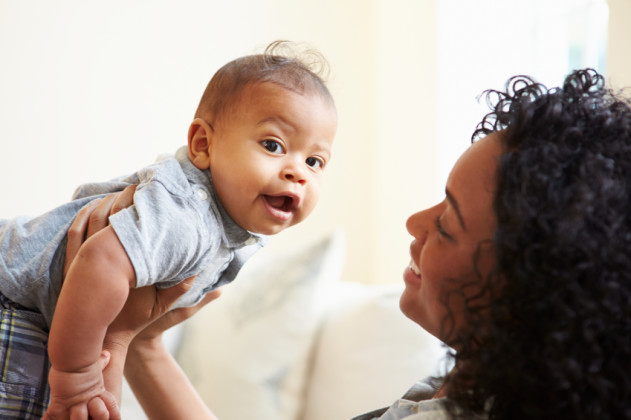Being a parent is forcing me to do the thing that scares me most: push aside the intrusive voices of family, friends, strangers, and my own self-doubts, and trust my own (and my partner’s) knowledge and intuition.
I was officially diagnosed with anxiety in 2014, but I’ve known my brain didn’t work like most people’s for way longer than that. To me, having anxiety feels like driving a car with eight different radios, all blaring equally important information at maximum volume, while simultaneously trying to navigate to a place I’ve never been. I’m usually on the verge of being overwhelmed. My sense of urgency is overdeveloped, I cry easily, and I’m not good at distinguishing between normal inconveniences and crises.
I used to say I wanted to wait until I got my mental health under control before I had a child, but eventually I realized that would mean waiting forever. Although I’m in therapy, it’s not moving me toward some theoretical point in the future where I’ll be cured; anxiety will always be a part of who I am and how I experience the world.
Having a mental health condition is enough of a problem in everyday life, but exponentially more frustrating when it comes to parenting. Lots of parents have written about how hard it is to avoid internalizing the idea that there’s a spectrum from “good” to “bad” parenting, but anxiety means that my self-consciousness about where I fall on that spectrum is cranked up to earsplitting levels. If I talk about attachment parenting and co-sleeping, will people roll their eyes at me for being a hippie? If I put the baby in her swing so I can wash some dishes, am I being responsible or neglectful? I know, logically, that other parents are my friends and compatriots, not my competition; still, I find myself constantly trying to look at my parenting through someone else’s eyes and score it, giving myself points for cloth diapering and taking them away for how often I look at my phone.
I think the “mommy wars” are mostly not real, but it’s hard not to get defensive when other parents (and especially non-parents) weigh in on my choices. Everyone has strong opinions about how you should raise your children, and most people are plenty generous when it comes to sharing them. It’s often not enough to simply disagree; you have to be able to back up your stance with statistics and citations. We arrived at our parenting style pretty organically and without a lot of research—the baby cries when we put her down, so we don’t do that very much, and so forth. I feel like “because we want to” should be a good enough explanation for the choices we make, but not everyone sees it that way.
I find myself defending those choices not only to people who parent differently, but to well-meaning family and friends who don’t understand why they can’t babysit yet or why they can only hold our daughter for a few minutes at a time. I wish those comments didn’t make me question my parenting. I wish it were easier for me to trust that I’m making the right choices for myself and my family, regardless of what anyone else might think.
My daughter is three months old, and the time at which I’ll need to explain my anxiety to her is still years away, but I think about it regularly. Children learn how to react to the world from their parents, but my reactions are so often disproportionate. How will I explain to my toddler that just because I’m panicking, that doesn’t mean she should? How will I teach her to tell the difference between my feelings and reality? That she is not responsible for managing my emotions, for shaping her behavior to my illness? How can I, a person terrified of the anger of others, give my daughter a safe space to express her anger? How can I avoid raising a child who shares my fears and weaknesses?
There’s no easy answer to these questions, but I have time—and the help of a supportive partner and a great therapist—to figure them out. I’m also working on building confidence in my identity as a parent when I still flinch at the slightest hint of criticism.
Having anxiety means struggling to enforce my boundaries, resisting the temptation to crumble in the face of disagreement. Being a parent means boundaries are absolutely crucial, because there’s no way to accommodate the opinions and desires and needs of every person in my life while also maintaining consistency for our family and my own mental health. Being a parent is forcing me to do the thing that scares me most: push aside the intrusive voices of family, friends, strangers, and my own self-doubts, and trust my own (and my partner’s) knowledge and intuition.
I don’t expect that I’ll do everything—or, indeed, anything—perfectly. But I believe it’s more important to set an example for my daughter of a woman who stands up for herself than to achieve a state of objectively perfect parenthood that probably doesn’t exist.
Would I be a better parent if I didn’t have anxiety? Maybe. But in some ways, my anxiety is making me—if not a better parent—at least a more thoughtful one. It’s teaching me the lesson I really need to learn myself, so that I can teach it to my child: No matter how scary it is, you have to do the thing you believe is best.
Lindsay King-Miller is a queer writer who lives in Denver with her partner, an ever-growing collection of books, and a very spoiled cat. She is the author of Ask a Queer Chick: A Guide to Sex, Love, and Life for Girls who Dig Girls (Plume 2016).
Other Links:

